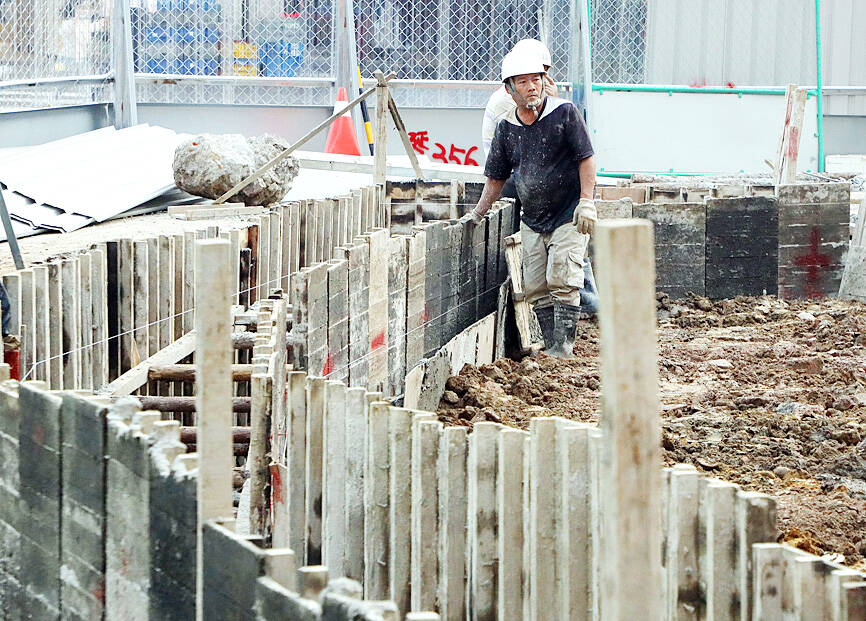Average monthly take-home pay in February increased 2.52 percent from a year earlier to NT$45,917, while total wages — which includes overtime pay, performance-based commissions and bonuses — soared 54.84 percent to NT$81,576 on the back of Lunar New Year bonuses, the Directorate-General of Budget, Accounting and Statistics (DGBAS) said yesterday.
Taiwanese firms on average issued Lunar New Year bonuses equivalent to 1.69 months of regular wages, or NT$77,348, the highest in nine years and up from 1.68 months a year earlier, Census Department Deputy Director Chen Hui-hsin (陳惠欣) said.
“The improvement came after service providers benefited from sustained revenge consumption in the post-COVID-19 pandemic era, although manufacturers took a hit from a global slowdown,” Chen told a news conference.

Photo: CNA
Financial and insurance companies offered the highest bonuses, averaging 3.64 months of wages, or NT$251,402, she said.
Manufacturers distributed 2.11 months of year-end bonuses, lower than the 2.14 months last year, she said, adding that suppliers of electronic components gave 2.76 months of bonuses, also weaker than 2.8 months a year earlier.
Exporters of tech and non-tech products had idle capacities and headcounts last year as they grappled with business declines induced by inventory adjustments and global inflation, Chen said.
Recreational facilities, hotels and restaurants fared better, issuing bonuses of 0.44 months to 0.74 months, compared with smaller bonuses or none last year, she said.
In the first two months of this year, regular take-home pay rose 2.39 percent annually to NT$46,017, while overall wages expanded 3.74 percent to NT$81,982, she said.
Real take-home wages after inflation remained in positive territory for the first time in two years with a 1.29 percent uptick as inflation pressure eased, Chen said.
The timing of the holiday also played a role, as local companies sometimes distribute year-end bonuses in December when the Lunar New Year is in January, she said.
Regular monthly wages have a fair chance of beating inflation due to the wage hikes and consumer price data, Chen said.
Holiday disruptions also explained why the number of workers hired in the industrial and service sectors in February shrank 0.25 percent, or about 21,000 people, compared with January, the DGBAS said.
Most firms halted operations for the holiday, it said.
As a result, the accession rate in February shed 0.07 percentage points to 2.04 percent, while the dropout rate gained 0.24 percentage points to 2.29 percent, it said.

Anna Bhobho, a 31-year-old housewife from rural Zimbabwe, was once a silent observer in her home, excluded from financial and family decisionmaking in the deeply patriarchal society. Today, she is a driver of change in her village, thanks to an electric tricycle she owns. In many parts of rural sub-Saharan Africa, women have long been excluded from mainstream economic activities such as operating public transportation. However, three-wheelers powered by green energy are reversing that trend, offering financial opportunities and a newfound sense of importance. “My husband now looks up to me to take care of a large chunk of expenses,

SECTOR LEADER: TSMC can increase capacity by as much as 20 percent or more in the advanced node part of the foundry market by 2030, an analyst said Taiwan Semiconductor Manufacturing Co (TSMC, 台積電) is expected to lead its peers in the advanced 2-nanometer process technology, despite competition from Samsung Electronics Co and Intel Corp, TrendForce Corp analyst Joanne Chiao (喬安) said. TSMC’s sophisticated products and its large production scale are expected to allow the company to continue dominating the global 2-nanometer process market this year, Chiao said. The world’s largest contract chipmaker is scheduled to begin mass production of chips made on the 2-nanometer process in its Hsinchu fab in the second half of this year. It would also hold a ceremony on Monday next week to

TECH CLUSTER: The US company’s new office is in the Shalun Smart Green Energy Science City, a new AI industry base and cybersecurity hub in southern Taiwan US chip designer Advanced Micro Devices Inc (AMD) yesterday launched an office in Tainan’s Gueiren District (歸仁), marking a significant milestone in the development of southern Taiwan’s artificial intelligence (AI) industry, the Tainan City Government said in a statement. AMD Taiwan general manager Vincent Chern (陳民皓) presided over the opening ceremony for the company’s new office at the Shalun Smart Green Energy Science City (沙崙智慧綠能科學城), a new AI industry base and cybersecurity hub in southern Taiwan. Facilities in the new office include an information processing center, and a research and development (R&D) center, the Tainan Economic Development Bureau said. The Ministry

ADVERSARIES: The new list includes 11 entities in China and one in Taiwan, which is a local branch of Chinese cloud computing firm Inspur Group The US added dozens of entities to a trade blacklist on Tuesday, the US Department of Commerce said, in part to disrupt Beijing’s artificial intelligence (AI) and advanced computing capabilities. The action affects 80 entities from countries including China, the United Arab Emirates and Iran, with the commerce department citing their “activities contrary to US national security and foreign policy.” Those added to the “entity list” are restricted from obtaining US items and technologies without government authorization. “We will not allow adversaries to exploit American technology to bolster their own militaries and threaten American lives,” US Secretary of Commerce Howard Lutnick said. The entities